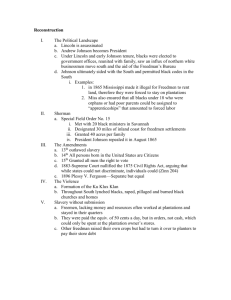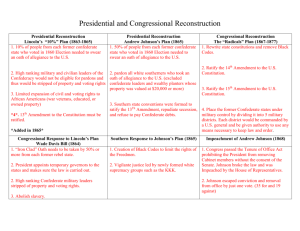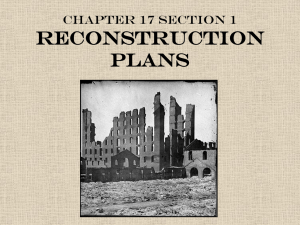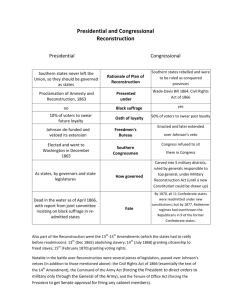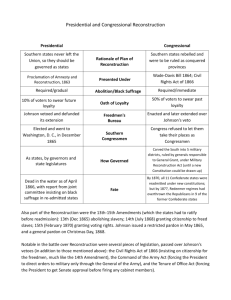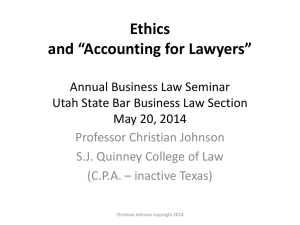Presidential Reconstruction The Plans of Lincoln and Johnson
advertisement
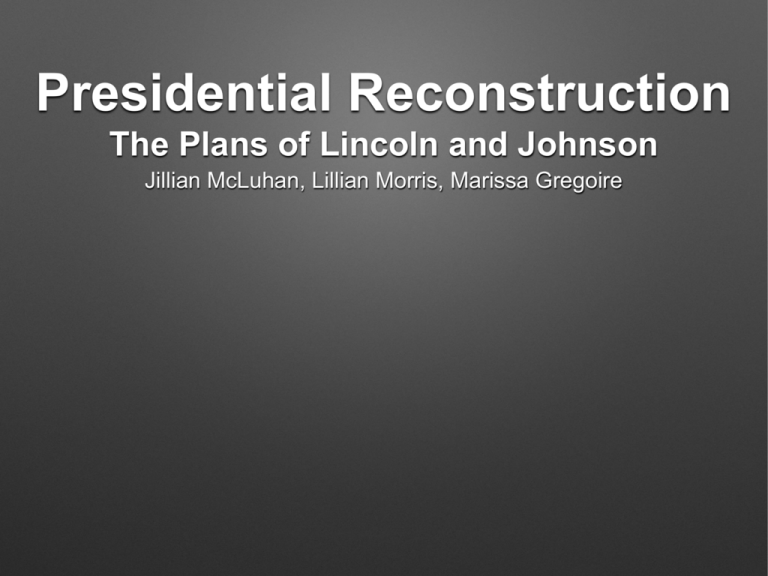
Presidential Reconstruction The Plans of Lincoln and Johnson Jillian McLuhan, Lillian Morris, Marissa Gregoire Presidential Reconstruction "When a civil war has been brought to a close, it is manifestly the first interest and duty of the state to repair the injuries which the war has inflicted, and to secure the benefit of the lessons it teaches as fully and as speedily as possible." -Andrew Johnson Presidential Reconstruction • The period (1865-1877) during which the states that had seceded to the Confederacy were controlled by the federal government before being readmitted to the Union • In 1864, Republican Abraham Lincoln chose Andrew Johnson, a Democratic senator from Tennessee, as his Vice Presidential candidate. Lincoln was looking for Southern support. He hoped that by selecting Johnson he would appeal to Southerners who never wanted to leave the Union. Presidential Reconstruction • After helping push through the 13th Amendment, abolishing slavery, the President sought to quickly restore the rebel states to the Union. He considered Reconstruction a "restoration" and wanted to quickly readmit the Amendment, repudiated the Confederate debt, and pledged loyalty to the Union. • During this time, Congress establishes the Joint Committee on Reconstruction Lincoln's Plan • He wanted to build a strong Republican Party in the South, rebuilding each state's own government back to its original design. • Restored the Union between the North and the South. • Congress didn't want Lincoln's Plan to follow through so they made the Ware-Davis Bill (1864) which required 50% of states male voters to take oath that they never supported the Confederacy. Lincoln's pocket veto kept it from becoming a law and so Congress was at a stalemate until Lincoln's assassination • He was assassinated in 1865. Johnson's Plan • Lincoln successor • He was sworn in as Vice President in March 1865, during his speech he rambled and was possibly drunk. • Public ally attacked the planter aristocracy and insisted that the rebellion must be punished. • Planter Aristocracy is the elite group of plantation owners. Historians defined higher ranked planters as owning over 50 slaves. Medium ranked planters owned 16-50 slaves Johnson's Plan • His amnesty proclamation (May 29, 1865) • It disenfranchised all former military and civil offer of the confederacy and all those who owned property worth $20,000 or more and made their estates liable to confiscation. • The obvious intent was to shift political control in the south from the old planter aristocracy to the small farmers and artisans, and it promised to accomplish a revolution in southern society. Johnson's plan • In 1865 Johnson put his plan into operation. • Under provisional governors appointed by him, the southern states held conventions that voided or repeal their ordinances of secession, abolish slavery, and (except South Carolina) repudiated confederate debt. Their newly elected legislatures (except Mississippi) ratified the thirteenth amendment guaranteeing freedom for blacks. • By the end of 1865 every ex-confederate state except Texas had rest abolished civil government. Johnson's plan • Control of white over black, however, seemed to be restored, as each of the newly elected state legislatures enacted statues severely limiting the freedom and rights of the blacks. • Laws, known as, black codes, restricted the ability of blacks to own land and to work as free labors and denied them most of the civil and political rights enjoyed by whites. • Many of the offices in the new government, more over, were won by disenfranchised confederate leaders, and the president, rather than ordering new elections, granted pardons on a large scale. He vetoed most of the bills that came his way and Congress overrode them. This became the habit of Johnson's presidency. Bibliography • digitalhistory.uh.edu • ushistory.org • sparknotes.com • infoplease.com

